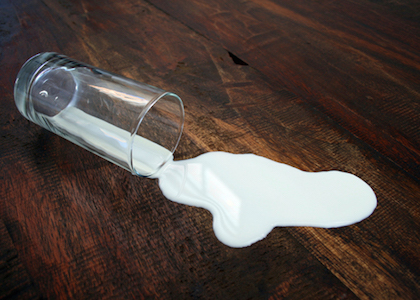
Why You Don’t Need Milk for Calcium
By Claire Georgiou, Reboot Naturopath, B.HSc ND
Calcium is a mineral that is essential for life, but guess what, you don’t need milk to get it!
Ninety-nine percent of the calcium in the body is involved in the strength and structure of the bones and the teeth while the other 1% of calcium in the body has an important role to play in nerve transmission, muscle contraction, hormone secretion, blood vessel dilation, contraction and blood clotting. The calcium that is required for metabolic functions is tightly controlled and does not fluctuate as calcium will be drawn from the bones if the diet is lacking to maintain blood levels.
Does milk really do the body good?
In a recent issue of JAMA (Journal of the American Medical Association) Pediatrics; Dr. Ludwig, a pediatric endocrinologist with a PhD in nutrition who specializes in childhood obesity at the Boston Children’s hospital has questioned the standard recommendation of 3 serves of low-fat milk daily. Dr. David Ludwig states, “‘Reduced-fat milk may be contributing to the obesity epidemic. The US Department of Agriculture, the American Academy of Paediatrics, and other organizations have formulated recommendations on healthy beverages. These guidelines consistently recommend limiting consumption of all calorie-containing liquids, except reduced-fat milk, of which people in most age groups are encouraged to consume 3 cups daily.”
Since a glass of low-fat milk contains approximately 13g of sugar (lactose) and 138 calories the recommendation of 3 glasses can give you 39g of lactose sugar and 366 calories per day just from milk. This article questions the scientific rationale for promoting reduced-fat milk consumption at these levels in children and adults and reconsiders the role of cow’s milk in human nutrition. It is also highlighted that children are encouraged to drink flavoured milks as a way of getting them to drink low-fat milk. Doing this further encourages larger intakes of sugar exceeding a healthy recommendation which may also contribute to further weight and health problems.
What about calcium?
It is suggested that we need up to 1200mg of calcium per day but interestingly, as Stacy covered in her article ‘The Truth about Calcium,’ the actual recommendation by the World Health Organisation is 500mg but they need to increase and adjust this recommendation to account for the increased calcium losses which is often due to high sodium and processed foods diets (SAD – Standard American/Australian Diet).
There are so many other contributing factors that can reduce the absorption and/or utilisation of calcium in the body such as caffeine, alcohol, excess sugar, smoking, some medications and exposure to heavy metals such as aluminium, lead, mercury and cadmium.
Questions still remain whether dairy products are as beneficial for our health and our bones as suggested. An interesting fact to consider is countries such as Africa and Asia who have the lowest fracture rates tend to consume little or no dairy products compared to countries that have the highest consumption of dairy also have the highest fracture rates. Japanese and Africans and native people living traditional lifestyles have been classified as “almost immune” to osteoporosis. Interestingly as these cultures become more Westernised, their rates of osteoporotic fracture steadily increase.
Walter Willett, MD, PhD, professor of epidemiology and head of the nutrition department at the Harvard School of Public Health states, “One of the main arguments for USDA recommendations is that drinking milk or equivalent dairy products will reduce the risk of fractures. But in fact there’s very little evidence that milk consumption is associated with reduced fractures.”
More Vitamin D for Bone Health
A study demonstrated that adequate vitamin D intake is associated with a lower risk of osteoporotic hip fractures rather than a high milk and calcium diet in postmenopausal women. Another study indicates that higher milk consumption does not reduce hip fracture rates.
Factors that have shown a greater influence on bone health are Vitamin D, Vitamin K, other micro-minerals and regular weight bearing exercise. High intakes of preformed Vitamin A (not plant-based) may increase the risk of osteoporosis.
There is also evidence suggesting high consumption of dairy may also be contributing to some forms of cancer such as prostrate cancer, ovarian cancer and heart disease.
Dairy Intolerance
Some people do not do well with dairy and may have lactose intolerance as it is normal for adults to have reduced levels of lactase in the digestive tract and this can increase problems such as post-nasal drip, sinusitis, hayfever, ear infections, Type 1 diabetes, asthma, eczema, IBS, anaemia, energy and weight gain. Here is more on dairy and is it making you sick.
Some people may find that they do better for consuming some unsweetened fermented dairy such as yogurt and kefir as opposed to milk.
Non-Dairy Calcium Sources:
Fish with the bones such as sardines (100g = 350mg), salmon(85g = 180mg) and mackerel (100g = 230mg)
Green Juice (16 – 18 oz./500 mls = 160mg)
Seaweeds such as agar (28g= 175mg), kelp and wakame(28g = 42mg)
Nuts and seeds like Almonds (28g/1oz = 74mg), Hazelnuts(28g/1oz = 32mg) , Brazil nuts(28g/1oz – 6 kernels = 45mg), Pistachios (28g/1oz = 30mg)
Sesame seeds (1 Tb = 88mg) & Tahini (1 Tb = 154mg)
Molasses (1 Tb = 41mg)
Beans (1 cup, black, kidney, cannellini, navy = 175 mg)
Fruits and vegetables such as figs(100g=35mg), okra, rutabaga, broccoli (1cup=43mg), chinese cabbage (1 cup = 74mg), bok choy, dandelion leaves (1 cup = 103mg), kale (1 cup = 90mg), watercress (1cup = 40mg), turnip greens (1 cup = 105mg), arugula (rocket)(1 cup = 32mg), parsley (1cup=83mg), prunes, dates, apricots and olives. All fruits and vegetables contain some calcium.
Some vegetables such as spinach, chard (silverbeet) and rhubarb have high calcium content, but they may also contain varying amounts of oxalic acid that binds calcium and reduces its absorption. Here is more on oxalates and calcium.
So as you can see a plentiful varied wholefood diet including juices will provide plenty of calcium throughout the day.